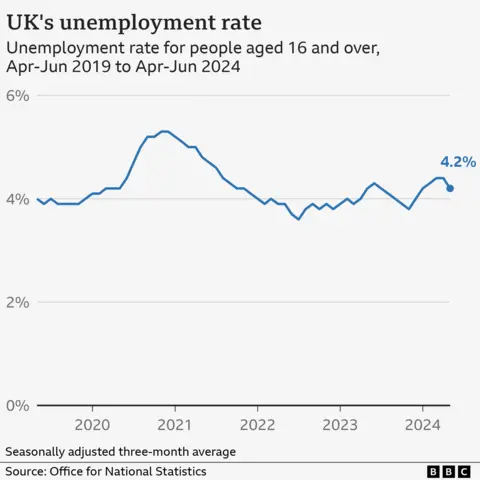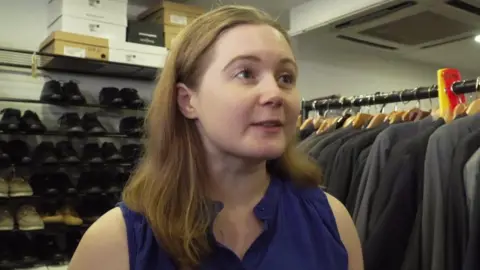 Getty Images
Getty ImagesThe UK’s unemployment rate has fallen slightly, official figures suggest.
Unemployment was 4.2% in the three months to the end of June, down from 4.4% over the previous quarter.
Meanwhile, wage growth continued to slow, rising at an annual rate of 5.4% – the weakest for around two years, figures from the Office for National Statistics (ONS) suggested.
Its director of economic statistics, Liz McKeown told the BBC’s Today programme despite the positive news that unemployment had fallen, there were signs that the jobs market was “cooling” due to high numbers of vacancies, redundancies and those not actively seeking work.
‘More to do’
The ONS has also urged caution about giving too much weight to its jobs figures at the moment.
Its Labour Force Survey, which produces the data, has had a smaller number of respondents over the past year than normal.
But Chancellor Rachel Reeves said the latest numbers, which were an initial first estimate, showed there was “more to do in supporting people into employment”.
“This will be part of my Budget later in the year where I will be making difficult decisions on spending, welfare and tax to fix the foundations of our economy so we can rebuild Britain and make every part of our country better off.”

The figures could pave the way for more interest rate cuts by the Bank of England this year.
In a closely-run decision, policymakers cut the rate to 5% from 5.25% earlier this month – the first reduction for more than four years.
Rates have been high as the Bank tries to control price rises across the economy.
But this has also driven up the cost of borrowing for consumers and led to higher wages which, while good for workers, may have made businesses cut back on hiring.
Estimated vacancies in the UK fell by 26,000 to 884,000 in the three months to July, the ONS says.
“Falling pay growth could help reassure the [Bank’s] Monetary Policy Committee that domestic inflationary pressures are subsiding,” said Yael Selfin, chief economist at KPMG UK.

Hannah Slaughter, a senior economist with the Resolution Foundation think tank, said that the rise in people “who aren’t working and aren’t looking for work” was worrying.
She said this was largely being driven by young people with long-term health conditions, particularly mental health problems.
“People in their early twenties are now more likely to be out of work due to sickness than people in their early forties, which is really worrying,” she said.
She said the government could address this trend by improving healthcare provision, particularly mental health care.

Six expert tips for finding work
1. Search beyond a 40 mile radius – Remote, hybrid and flexible working open up opportunities further away.
2. Use key words in your searches – Online algorithms will pick up on daily searches and send you more of the same.
3. Don’t wait for a job to be advertised – Contact a manager at a business that you like the look of as you never know what opportunities might be coming up.
4. Sell your skills – Use social media sites like Linkedin which showcase your skills and experience. Other platforms like Twitter and Instagram can prove useful when touting yourself out to potential employers as well.
5. Get learning – While you’re on the hunt for a job see if there are way to fill gaps in your CV with free courses, volunteering or shadowing.
6. Celebrate the small wins – set personal targets, like a tracker of the number of jobs to apply for in a week or a certain number of cold emails and acknowledge the little wins along the way to keep your spirits up.
You can read tips from careers experts in full here.


